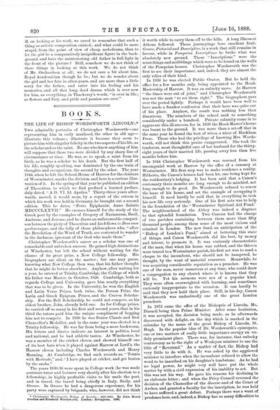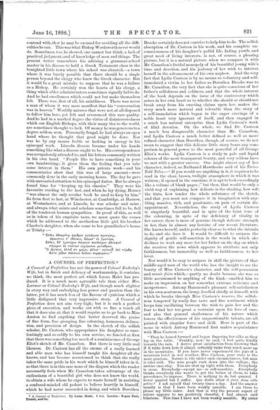BOOKS.
THE LIFE OF BISHOP WORDSWORTH (LINCOLN).*
Two admirable portraits of Christopher Wordsworth—one representing him in early manhood, the other in old age— illustrate this volume; illustrate it because they seem to picture him with singular felicity in the two aspects of his life, as the scholar and as the saint. No one who knew anything of him will suppose that these two were divided by any sharp line of circumstance or time. He was, so to speak, a saint from his birth, as he was a scholar to his death. But the first half of his life, roughly speaking, was dominated by the one train of thoughts and occupations, the second by the other. The year 1844, when he left the School-House of Harrow for the cloisters of Westminster, marks the division, and here is a curious illus- tration of it. In the spring of that year he published an edition of Theocritus, to which we find prefixed a learned preface, duly dated, " A.D. VI. Id. Apiiles." Thirty-three years after- wards, moved, it would seem, by a report of the esteem in which his work was held in Germany, he brought out a second edition. This he dates, " Festo Epiphanim, Ammo Salutis MDCCCLXXVII." He excuses himself for the study of the Greek poet by the examples of Gregory of Nazianzum, Basil, Ambrose, and Jerome, and he draws an unfavourable compari- son between the piety of Theocritus and his fellows in Deos suos qualescunque, and the folly of those philosophers who, "after the Revelation of the Word of Truth, are contented to wander in the darkness, ignorant of the God who made them."
Christopher Wordsworth's career as a scholar was one of remarkable and unbroken success. He gained high distinctions at Winchester, but left the school without waiting for the chance of its great prize, a New College fellowship. His biographers are silent on the matter ; but one may guess, knowing what New College then was, that his father thought that he might do better elsewhere. Anyhow, after waiting for a year, he entered at Trinity, Cambridge, the College of which his father was Master, in October, 1826. Cambridge, both as regards College and University, gave him nearly everything that was to be given. In the University, he won the English and Latin Verse Prizes, both twice, the Porson Prize, the Latin and Greek Epigram Prizes, and the Craven Scholar- ship. For the Bell Scholarship he could not compete, as his eldest brother, John, already held one. As for College prizes, he carried off so many in his first and second years, that in his third the tutors paid him the unique compliment of begging him not to compete. In 1830 he was Senior Classic and first Chancellor's Medallist, and in the same year was elected to a Trinity fellowship. He was far from being a mere bookworm. His letters and diaries indicate an interest in politics, local and national, and he had athletic tastes. At Winchester, he was a member of the cricket eleven, and showed himself one of its beet bats wben it played against Harrow at Lord's, the Harrow eleven including Charles Wordsworth and Henry Manning. At Cambridge, we find such records as, "Tennis with Merivale," and," I have played at cricket, and got beaten by the snobs."
The years 1830-36 were spent in College work (he was made assistant-tutor and lecturer very shortly after his election to a fellowship), in highly profitable visits to his uncle the poet, and in travel, the travel being chiefly in Italy, Sicily, and Greece. In Greece he had a dangerous experience, for his party were captured by brigands, who, however, did not think
• Christopher Wordsworth, Bishop of Lincoln, 18074885. By John Henry Overton and Elisabeth Wordsworth. London Rivingtons. 1888.
it worth while to carry them off to the hills. A long illness at Athens followed. These journeyings bore excellent fruit.
Greece, Pictorial and Descriptive, is a work that still remains in favour, while in Pompeian Inscriptions he broke what was absolutely new ground. These "Inscriptions" were the scratchings and smibblings which were to be found on the walls of the Pompeian houses. Christopher Wordsworth was the first to see their importance, and, indeed, they are almost the only relics of their kind.
In 1836 he was elected Public Orator. But he held the office for a few months only, beim:, appointed to the Head-
Mastership of Harrow. It was an Unlucky move. At Harrow "the times were out of joint," and Christopher Wordsworth was not the man "to set them right." The biographers pass over the period lightly. Perhaps it would have been well to have made a franker confession that their hero was quite out of his place. Anyhow, the result was nothing less than disastrous. The numbers of the school sank to something considerably under a hundred. Private calamity came in to aggravate this ill-success, for in 1838 the Head-Master's house was burnt to the ground. It was more than a set-off that in the same year he found the best of wives, a niece of Hookham Frere. Those who had the privilege of knowing Mrs. Words- worth, will not think this praise exaggerated. She took the tenderest, most thoughtful care of her husband for the thirty- eight years of their married life, passing away less than five months before him.
In 1844 Christopher Wordsworth was rescued from his uncongenial work at Harrow by the offer of a canonry at Westminster. His first step was to make residence a reality. Hitherto, the Canon's houses had been let, one being kept for the residentiary's lodging. It has been said that a Canores customary three months are long enough to do mischief, not long enough to do good. Dr. Wordsworth refused to renew the lease of his house, and set the example of occupying it himself. It need hardly be said that in everything he took his new life very seriously. One of his first acts was to help in the foundation of the "Westminster Spiritual Aid Fund.' The neighbourhood of the Abbey was indeed a disgrace to that splendid foundation. Two Canons had the charge of two parishes containing between them more than fifty thousand people, among them some of the most vicious and criminal in London. The new fund, an anticipation of the "Bishop of London's Fund," aimed at bettering this state of things, and Canon Wordsworth did his best, by money and labour, to promote it. It was curiously characteristic of the man, that when his house was robbed, and the thieves were traced to a Westminster parish, his first act was to send a cheque to the incumbent, who should not be hampered, he thought, by the want of material resources. Meanwhile, he was acquiring considerable reputation as a preacher. He was one of the men, never numerous at any time, who could draw a congregation to any church where it is known that they will be. Yet his sermons were not of a popular kind. They were often overweighted with learning, and sometimes curiously inappropriate to the occasion. It can hardly be said that they now hold their place. Still, in his day, Canon Wordsworth was undoubtedly one of the great London preachers.
In 1872 came the offer of the Bishopric of Lincoln, Mr. Disraeli being then Prime Minister. After some hesitation, it was accepted, the decision being made, as he afterwards discovered with delight, on the day which is marked in the calendar by the name of the great Bishop of Lincoln, St. Hugh. In the popular idea of Dr. Wordsworth's episcopate, one or two matters of really little importance occupy an un- duly prominent place. There was, for instance, that unlucky controversy as to the right of a Wesleyan minister to use the title of "Reverend." As a matter of fact, the Bishop had very little to do with it. He was asked by the aggrieved minister to interfere when the incumbent refused to allow the word to be inscribed on his daughter's tombstone. As he had no legal power, he might very well have put the whole matter by with a civil expression of his inability to act. But this was not his way. He gave his reasons for declining in an elaborate letter ; and when the Privy Council reversed the- decision of the Chancellor of the diocese and of the Court of Arches, and granted a faculty for the inscription, he was held to have suffered a great defeat. Perhaps there was a want of prudence here, and, indeed, a Bishop has so many difficulties to
contend with, thit he may be excused for avoiding all the diffi- culties he can. This was what Bishop Wordsworth never would do. Sometimes, too, he showed, one cannot but think, a lack of practical judgment, and of knowledge of men and things. The present writer remembers his advising a grammar-school master in his diocese to hold a Greek Testament class in the benighted little town where his school was situated,—a town where it was barely possible that there should be a single person beyond the clergy who knew the Greek character. But it would be a great mistake to suppose that he was a failure as a Bishop. He certainly won the hearts of his clergy, a thing which abler administrators sometimes signally fail to do. And he had excellences which could not but make themselves felt. There was, first of all, his saintliness. There was never a man of whom it was more manifest that his "conversation was in heaven." Worldly natures that were not at all disposed to follow him here, yet felt and reverenced this rare quality. And he had in a marked degree the virtue of disinterestedness which our English Bishops, with their many ties to the world, are sometimes thought to lack. Of money he was generous to a degree seldom seen. Personally frugal, he had always an open hand where he thought that good might be done. Nor was he by any means feeble or lacking in energy in his episcopal work. Lincoln diocese became under his hands something like what a diocese ought to be. His correspondence was scrupulously attended to, and his letters commonly written in his own hand. "People like to have something in your own handwriting ; it gives them the feeling that you take some interest in them." His own private work—and his commentaries show that this was of large amount—were commonly done in the early morning hours. The day he gave with unwearied attention to his episcopal duties. But he always found time for "keeping up his classics." They were his favourite reading to the last, and when he lay dying, Horace "was almost the only secular book he used to keep by him." So from first to last, at Winchester, at Cambridge, at Harrow, at Westminster, and at Lincoln, he was scholar and saint ; and always, what saints and scholars sometimes fail to be, full of the tenderest human sympathies. In proof of this, as well as in token of his exquisite taste, we must quote the verses which he addressed to the motherless little girl, his brother Charles's daughter, when she came to her grandfather's house at Trinity :—
"Ades itaarrpirrne Ottapov -yeAtiotera rrpocroftwol, fitpauctros T' Aims, Uttar' is itteg4pa, tifAOES, SO' ittere'pou Ociparav treveattev aSacpsti cruepca, en ro6rcov oixffaerou neAcitipaw, 11 Opicpos, alaci u xalpE, tplitov tceivouE' 7rl riqtflep &are 13d5ow BiAltote eivOccrs irotnpvp‘ois."



































 Previous page
Previous page